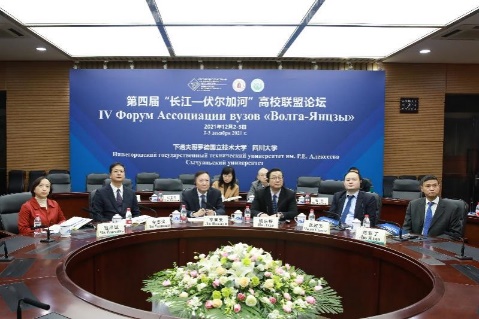
The “Yangtze–Volga” University Alliance (short for the Sino–Russian University Alliance of the Upper and Middle Reaches of the Yangtze River and the Federal District Along the Volga River) successfully held its fourth forum on Dec. 2nd and 3rd under the joint sponsorship of Sichuan University and Nizhny Novgorod State Technical University. The forum was attended by Counsellor Zhang Weili of the Department of European–Central Asian Affairs of the Ministry of Foreign Affairs, Deputy Plenipotentiary Representative Mashkovtsev of the Russian President’s Office of the Federal District along the Volga River, President Dmitriyev(head of the Russian side), Vice President Gonzalovof the Nizhny Novgorod State Technical University, President Li Yanrong (head of the Chinese side), Vice President Yao Leye, and Guo Yong, deputy Party secretary of Sichuan University, and other leaders, guests, experts and scholars from more than fifty Chinese and Russian universities. Vice President Gonzalov presided over the opening ceremony.
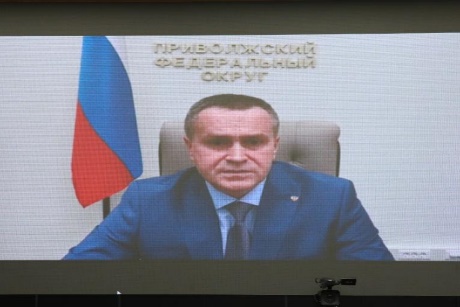
In his address, Deputy Plenipotentiary Representative Mashkovtsev stated that the China-Russia relations are at the best level in history right now, and the bilateral relations have been elevated to a new stage of comprehensive strategic partnership. The 2020-2021 is the year of the Sino-Russia science and technology innovation. The Sino-Russia mutual scientific and technological innovation year is an important consensus reached by President Xi Jinping and President Putin. It has added new impetus to the cooperation between universities of the two countries. Since the founding of the “Yangtze–Volga” University Alliance, fruitful results have been achieved in joint talent training; cooperation over scientific innovation; and cultural, economic and trade cooperation, etc. He hoped that Russian and China will, through this forum, further their cooperation, promote the exchange and mutual visit between young scholars and research groups of the two countries, contributing to the common development of both countries.
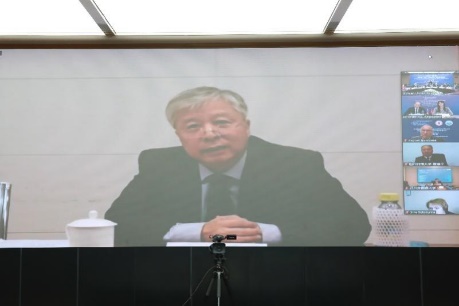
Zhang Weili said in his speech that the "Yangtze-Volga" University Alliance is an important part of the two river mechanism in the field of people to people and cultural cooperation and a beneficial practice for both sides to deepen educational cooperation. He hoped that the University Alliance will play a more active role in strengthening regional scientific and technological innovation and cooperation by drawing upon the strength of universities and rich human resources in the region. We ought to further tap the wisdom and potential of young people, and strengthen scientific research exchanges and innovative cooperation among young people.
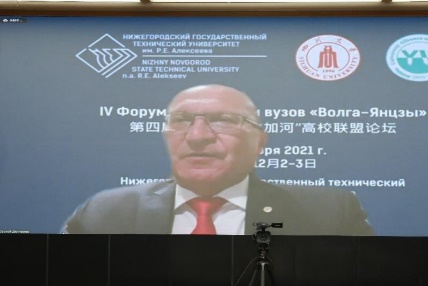
President Dmitriyev noted in his address that the purpose of the "Yangtze-Volga” University Alliance is to coordinate and unify the alliance universities, train high-quality talent for the Federal District along the Volga Riverof the Russian Federation and the middle and upper reaches of the Yangtze River in China, jointly carry out scientific research and develop international cooperation among regions.The University Alliance has become a very important platform for colleges and universities of the two countries in the fields of education, science and technology, people to people and cultural exchanges since its founding. During the pandemic, the alliance universities continued with educational, science and technology cooperation online and achieved fruitful results. This forum focuses on innovation cooperation and aims to provide greater assistance for scientific and technological innovation as well as scientific research cooperation between universities of the two countries.
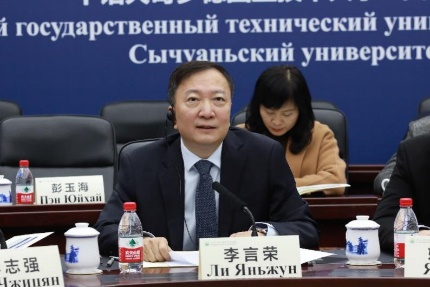
In his speech, Li Yanrong offered, on behalf of the Chinese universities, congratulations on the convening of the forum. He said that as an important platform for regional cooperation, people to people and cultural exchanges between China and Russia, the University Alliance has joined 84 universities since its establishment in 2017, and has made a lot of achievements in education, science and technology, culture and so on. Since the outbreak of the pandemic, the alliance has continuously improved its mechanism, built a regional cooperation database, carried out online exchanges, and deepened the interaction between Chinese and Russian youth. He said that in the post-pandemic era, he hoped that the alliance universities will further deepen cooperation in three respects. First, adhere to openness and sharing and innovate the forms of student exchange. Second, adhere to complementary advantages and innovate the mode of scientific and technological cooperation. Third, adhere to deepening cooperation and innovate the construction mode of think tanks.
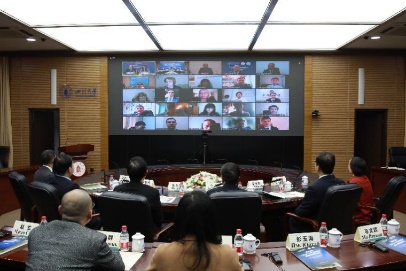
At the forum, leaders, experts and scholars from Chinese and Russian universities conducted in-depth discussions on strengthening China-Russia cooperation, promoting joint talent training, deepening scientific research cooperation, focusing on innovation and creation, and strengthening healthcare, information security, environmental protection, humanities and art exchanges. At the closing ceremony, Guo Yong and Gonzalov thanked the guests for participating in the Forum on behalf of the universities of the China-Russia alliance. They hoped that both sides can join hands to further strengthen practical cooperation within the framework of the "Yangtze-Volga" University Alliance, provide due services and make contributions to the win-win cooperation between China and Russia.
